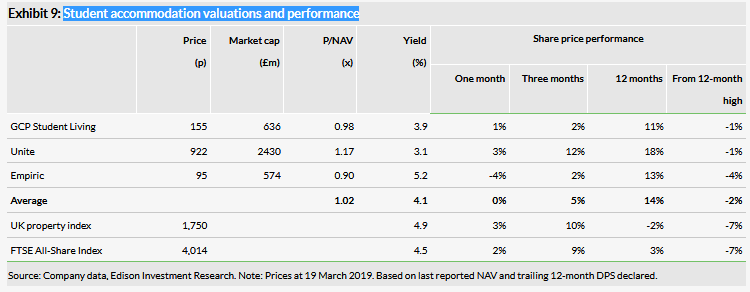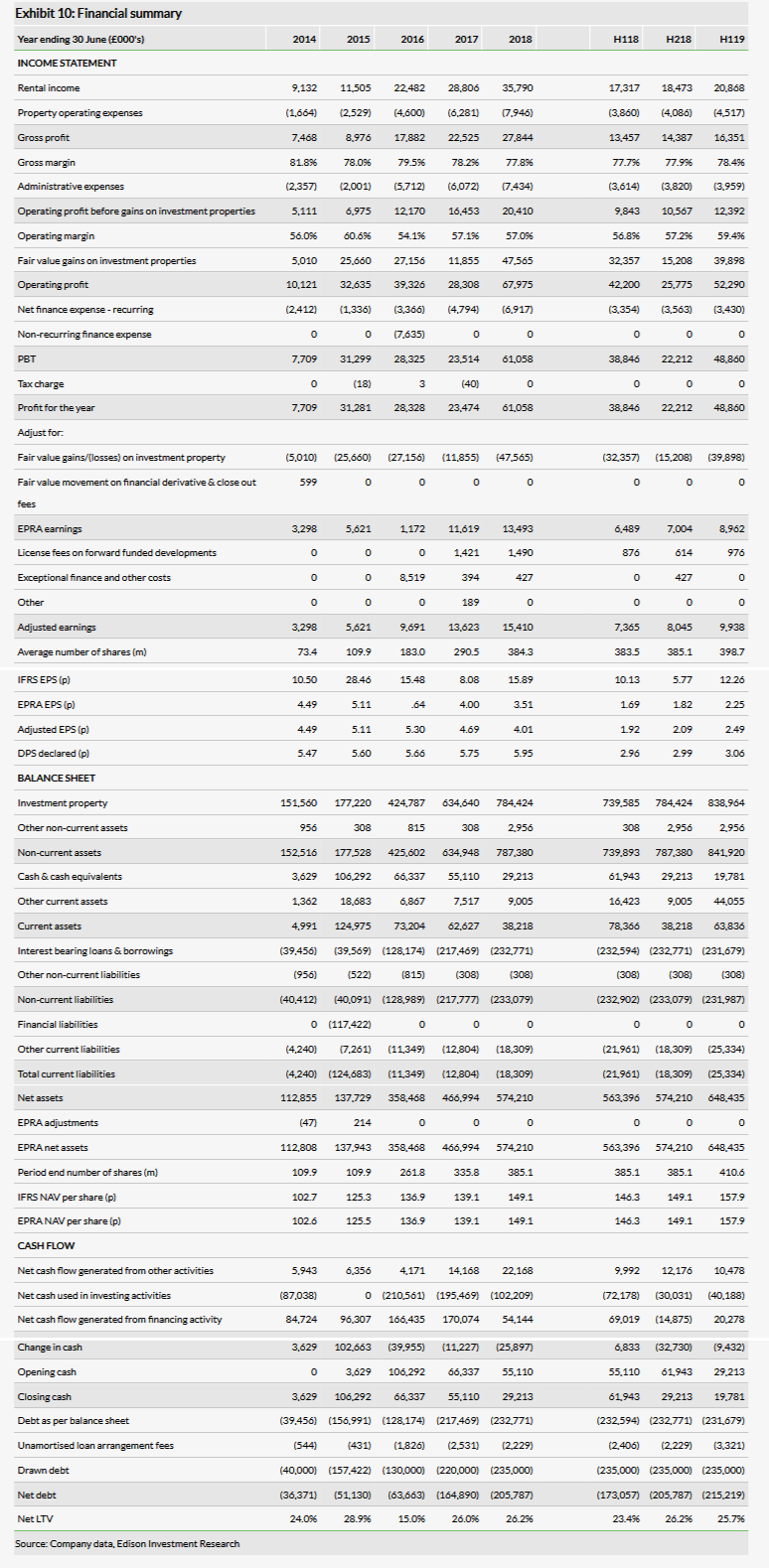Strong growth continued at GCP Student Living PLC (LON:DIGS) in H119. Rental income benefited from development/refurbishment completions, above inflation rental growth and continued full occupancy. Profitability showed the benefit of scale economies, with the operating margin increasing. Dividend cover increased strongly to 81%, well on track for full coverage on a fully developed and let basis. The existing portfolio is performing well (H119 NAV total return of 7.9%), developments are on track to deliver further income growth, and the company continues to identify attractive opportunities for further growth.
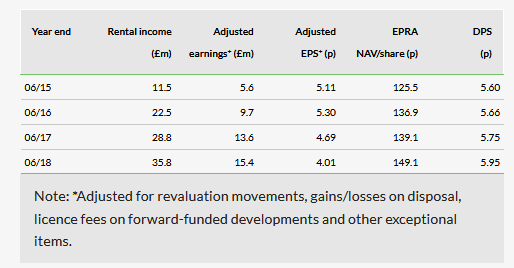
7.9% H119 NAV total return
H119 rental income grew c 21%, including a full period contribution from Scape Wembley (opened in September 2017), a three-month contribution from Scape Bloomsbury (opened in September 2018), above inflation rental growth of 3.5%, and full occupancy. The operating margin increased to c 59% from c 57% in H118, adjusted earnings grew 35% to £9.9m, and adjusted EPS by 30% to 2.49p. H1 DPS increased 3.4% y-o-y to 3.06p. The portfolio valuation benefited from rental growth, operational progress and a further tightening of market yields. NAV per share increased to 157.93p from 149.12p at end-FY18.
Strong student and investor demand in London
Positively for DIGS, with 92% of its portfolio in and around London, international student applications are up 9.0% compared with last year. Despite Brexit, EU applications also show slight growth. Government plans to boost international student numbers and income are also a positive. DIGS’s bookings are ahead of the same time last year. In the investment market, recent transactions indicate continuing strong investor interest in London assets in particular. As well as highlighting the attractiveness of the DIGS existing portfolio, it suggests potential for further valuation gains. With London planning policy reinforcing a tight supply situation, DIGS will soon decide on whether to exercise its option agreement with Scape Student Living to acquire an additional attractive new-build asset adjacent to Queen Mary University of London and Scape East.
Positive fundamentals support growth and returns
Growing dividends are supported by continuing strong fundamentals in DIGS’s chosen markets, and should be fully covered on a fully operational basis. The shares trade at a small discount to NAV, despite share price and NAV returns since IPO continuing to be well above the 8–10% target, and good potential for further income and capital growth.
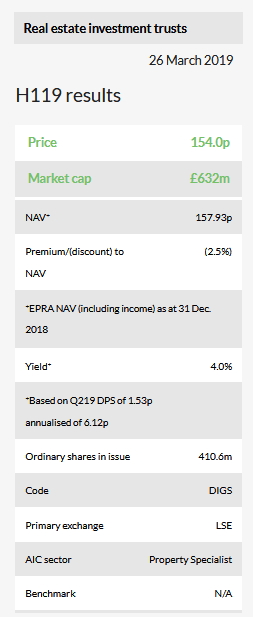
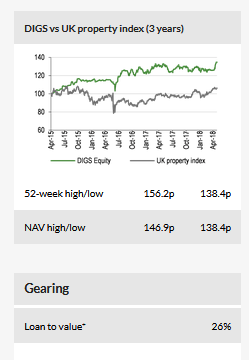


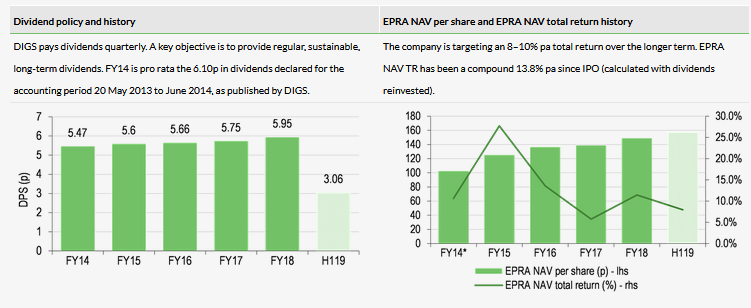
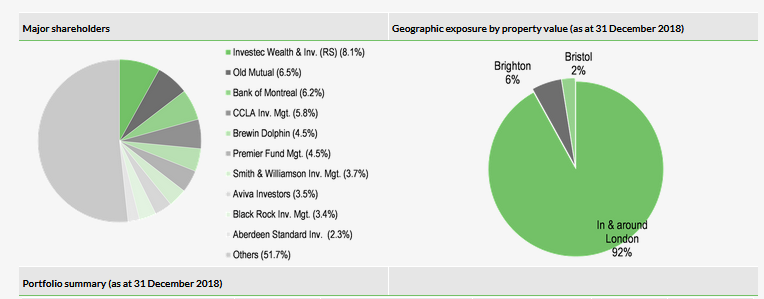
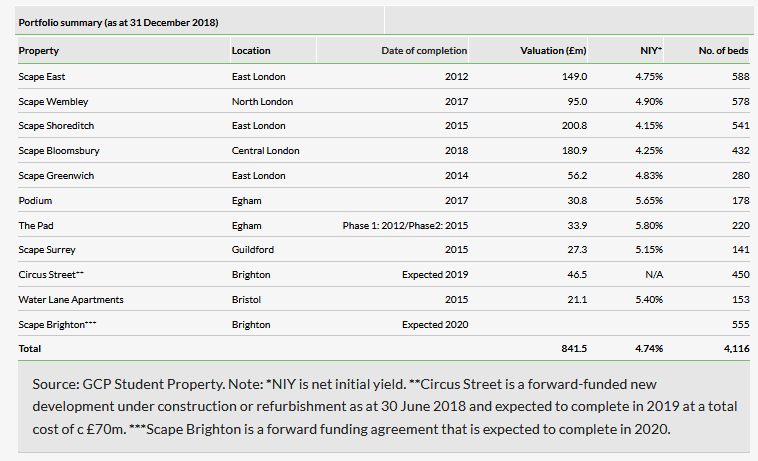
London-focused student accommodation
GCP Student Living (DIGS) is a specialist UK real estate investment trust (REIT), investing in student residential assets, and differentiated by a focus on assets in and around London. The shares have been listed since May 2013 and the company has a premium listing on the FCA’s Official List, trading on the Premium segment of the Main Market of the London Stock Exchange. The investment objective is to provide shareholders with attractive total returns in the longer term through the potential for modest capital appreciation and regular sustainable dividends with RPI inflation-linked characteristics.
The student housing sector continues to attract investor interest for its favourable risk-adjusted yields, good levels of rental growth and less exposure to the economic-led cycles that affect traditional commercial property sectors such as offices, industrial and retail property. DIGS is focused on assets in or around London in order to benefit from a structurally positive demand-supply balance, which is no longer the case in all regions of the UK. The London market continues to see increasing numbers of international and post-graduate students, driving demand for purpose-built student accommodation (PBSA), while planning restrictions and competing demands limit supply. Geographically, DIGS will also invest in other markets that offer similar market dynamics (eg Brighton). Within these markets, the investment manager targets high-specification, modern, purpose-built accommodation with proximity to a suitable higher education institution and/or a major transport hub. Such properties, in the chosen locations, may be more likely to both appeal to students today and offer longevity of income potential to support long-term value creation, even if the current yields may be lower.
At 31 December 2018, the portfolio comprised the 11 assets shown at the bottom of Exhibit 1, providing c 4,100 beds, of which c 3,100 are operational and fully let for the 2018/19 academic year. The portfolio value was £841.5m, reflecting a net initial yield (NIY) of 4.74%.
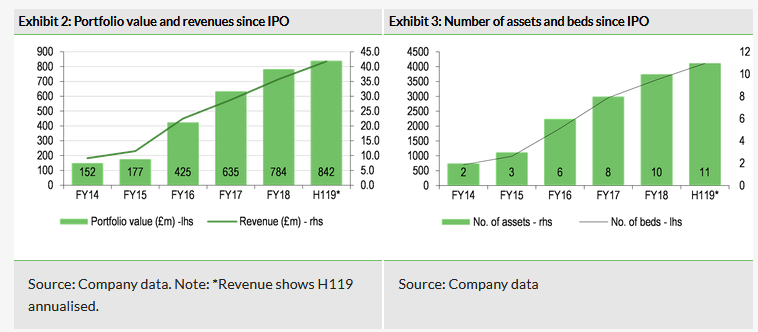
Gravis, the external investment manager, was established in 2008 and is privately owned by its directors and founding members. It currently manages £2.6bn in assets, including two other listed closed-end vehicles. Nick Barker from Gravis is the fund manager with day-to-day responsibility for the provision of investment advice to DIGS. The primary asset manager is Scape Student Living, which is closely aligned with Gravis, the directors of which own 50% of Scape.
Strong income growth and increased dividend cover
Interim results for the six months ended 31 December 2018 (H119) show the current portfolio performing well and continuing to grow. Rental income grew strongly, benefiting from development/refurbishment completions, above inflation rental growth and continued full occupancy. Profitability is additionally showing the benefit of scale economies. Dividends have been set, and investment decisions made, based on the investment manager’s expectation that they will be covered by earnings on a fully developed and let basis. With dividend cover increasing to 81%, the H119 results provide evidence that the company is well on track to achieve this. EPRA (and IFRS) NAV per share increased by 5.9% during H119 to 157.93p. Including dividends paid during the period, the six-month NAV total return was 7.9%.
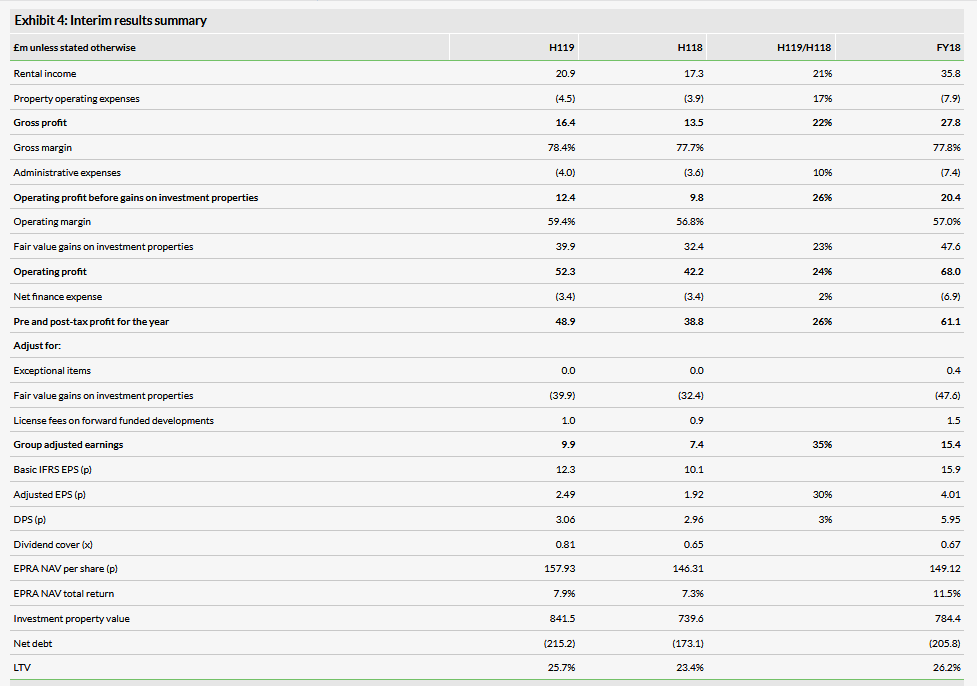
Key financial highlights from the H119 results
Rental income increased by c 21% compared with H118, to £20.9m, and gross profit by 22% to £16.4m, with the gross margin increasing slightly to 78.4%. The drivers of rental income growth included a full period contribution from Scape Wembley (which opened for the 2017/18 academic year), a first time (c three-month) contribution from Scape Bloomsbury, which opened for the 2018/19 academic year following refurbishment, and average 3.5% rental growth across the portfolio. The portfolio was again fully occupied for the 2018/19 academic year.
The scale benefits of the growing portfolio can be seen in both increased profits and enhanced profitability. Administrative costs, which comprise fund running costs, including the investment manager’s fee and other third-party service provider costs, grew by 10%. This was well below the growth in income, and as a result operating profit before property valuation movements increased by 26% to £12.4m. The operating margin was 59.4% compared with 56.8% in H118 and 57% for the full FY18 year.
On a net basis, finance costs were little changed, with H119 property investment funded primarily from cash balances, including the £37.5m net proceeds from the September 2018 share placing. To part-fund future investments and existing fund commitments, debt facilities were increased by £100m but as yet remain undrawn.
The value of the investment portfolio has increased to £841.5m, including investment spending and a net fair value movement of £39.9m, equivalent to 5.1% of the opening value. The gains were driven by both rental growth, the completion and opening of Scape Bloomsbury and yield compression, with the latter given evidential support by a number of important market transactions in and around London. The end-H119 blended net initial yield on the DIGS portfolio was 4.74% compared with 5.04% at end-FY18.
Including the revaluation gains, IFRS earnings increased by 26% compared with H118, to £48.9m. Adjusted earnings, which excludes the valuation gain, adjusts for other one-off items, and includes licence fees on forward-funding developments, increased by 35% to £9.9m. Adjusted EPS increased 30% to 2.49p.
Dividends declared during H119 were 3.06p, an increase of 3.4% from the 2.96p declared in H118 and also ahead of the 2.99p declared in H218. As the company had previously guided, the opening of Scape Bloomsbury has contributed to a strong increase in coverage of dividends by adjusted earnings. It was 81% in H119 compared with 70% in H218 and 67% for FY18 as a whole. On a fully operational and let basis, DIGS continues to expect dividends paid to be fully covered by earnings.
DIGS says that bookings for the 2019/20 academic year are ahead of the level at the same time last year, and that repeat bookings have continued to increase over time.
Significant recent operational developments
Scape Bloomsbury, providing 432 beds in the heart of central London, was completed ahead of schedule, in time for the 2018/19 academic year. DIGS had initially expected to open the first five floors in September and the top three floors in December, but was able to fully open in September with higher than budgeted overall initial occupancy.
Construction work on the c 450-bed, forward-funded office project at Circus Street in central Brighton is proceeding in line with expectations towards planned completion in time for the 2019/20 academic year. Unlike the majority of DIGS assets, Circus Street is let on a 21-year, RPI-linked lease to Kaplan at an initial rent of £2.9m. The development includes a standalone, speculatively developed, integrated Grade A office building, which is generating strong interest from potential occupiers and investors given a tight Brighton market. It will be retained or sold, and the capital recycled, when completed and stabilised, depending on the nature of the tenant. Licencing fee income, at a rate of 5.5% of the funding extended, is recognised in adjusted income.
In July 2018 DIGS entered into a conditional contract to acquire and forward-fund Scape Brighton, its second asset in the city, situated on the University of Brighton’s main campus. Scape Brighton is expected to provide 555 beds and extensive communal areas, with c 1,500 sq ft of retail space, on the primary campus of Brighton University. Construction work began in November 2018 and the asset is expected to be operational in September 2020, in time for the 2020/21 academic year. DIGS provided approximately £24m of forward funding in H119, which is initially accounted for as a loan receivable asset on the balance sheet.
Under the contractual arrangement with Scape Student Living that has allowed DIGS to acquire several attractive, newly developed assets since IPO, the company has an option to acquire Scape Canalside, a 412-bed, new-build asset located adjacent to Queen Mary University of London, in the same locality as the group’s existing c 590-bed Scape East asset. Scape Canalside is expected to reach practical completion by July 2019 and DIGS must soon decide whether to exercise its option or not. The asset is highly attractive to DIGS and the decision substantially rests on it having access to suitable funding. The design of Scape Canalside and its market positioning are complementary to the existing Scape East asset and similarly, it benefits from close proximity to Queen Mary University, a strong Russell Group higher education institution. The increasingly stringent planning environment in London also increases the attractiveness of the option, providing access to a further significant, high-quality, purpose-built asset. Recent transaction activity (see below) suggests an increasing scarcity value for schemes that have already received planning approval.
Increased, more flexible funding in place
At the end of H119, DIGS had a cash balance of £19.8m with drawn debt of £235m, at a blended fixed rate of 2.96%, and a remaining term of seven years. The loan to value ratio was 25.7%. DIGS’s outstanding commitments include the remaining construction work at Circus Street, Brighton, the forward-funding commitment to Scape Brighton, and the forward purchase agreement for Scape Canalside. To provide the funding for this additional portfolio growth, DIGS has in recent months increased its equity and debt capital resources:
In September 2018 DIGS completed the placing of 25.5m new shares at a price of 149.50p, raising £38.1m of gross new equity capital (£37.5m net).
In July 2018 it agreed a £45m, three-year re-drawable credit facility (RCF) with Wells Fargo (NYSE:WFC) at a margin of 1.85% pa above three-month Libor. The RCF provides more flexible debt finance than fixed long-term debt and will be available for use in funding the completion of Circus Street, Brighton, and initial construction costs at Scape Brighton, as well as general corporate purposes.
In December 2018, DIGS added a £55m development loan facility, also with Wells Fargo, intended to part-fund the construction of Scape Brighton. The facility has a margin of 3.1% pa above three-month Libor during the construction phase, falling to 2.0% pa above Libor once the asset has been completed and stabilised.
In aggregate, the new debt facilities with Wells Fargo provide DIGS with £100m of flexible floating rate debt. This will avoid the need for DIGS to hold excess cash ahead of development funding, and extends the positive spread between the licence fees on development forward-funding and the cost of the debt, which should further support increasing dividend cover.
Positive market developments
Continuing above-inflation rental growth
In terms of income returns, DIGS targets regular sustainable dividends with RPI inflation-linked characteristics. A relatively small proportion of rental income is contractually directly linked to RPI (Circus Street at completion will be an exception), and so the inflation-linked characteristic relies on the selection of suitable assets and locations with favourable demand-supply dynamics that have the potential to deliver continuing rental growth. Exhibit 5 shows that DIGS has been able to sustain rental growth in excess of both RPI and the market over several years.
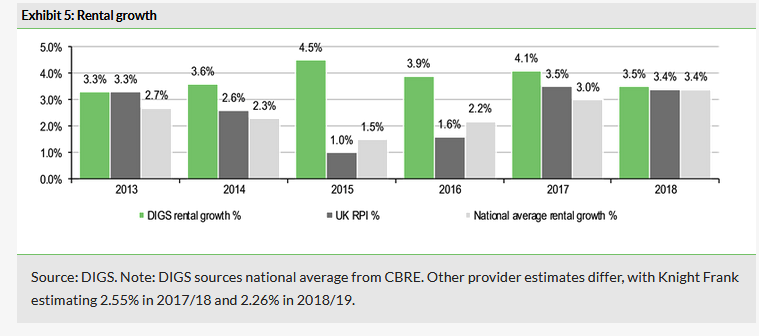
London remains differentiated
From a student demand-supply perspective, the differentiating features of the London market can be summarised as:
It is home to more than 300,000 full-time students, more than any other city in the UK.
Four of the top 50 universities in the world are in London, as are five of the 24 Russell Group universities, widely perceived as representing some of the best universities in the country.
As a result of the high standard of education available, and the wider appeal of London as a place in which to live, a quarter of all of the c 460,000 international students studying in the UK are based there.
London universities are only able to supply accommodation to c 30% of their first year and international students.
Two significant trends that favour DIGS’s London area focus are for the strongest universities to attract an increasing share of applicants, and the continuing strength of international student applications.
Since the UK government raised tuition fees to a maximum of £9,000 pa in 2012 (and subsequently increased to £9,250), which was followed by a removal of the cap on undergraduate student numbers in 2015, there is clear evidence that many students are influenced in their choice of university by its cost and the expected future benefit. This has enabled the top universities to grow in size while maintaining their academic requirements. Given its concentration of top universities (home to six of the top 40), London has benefited.
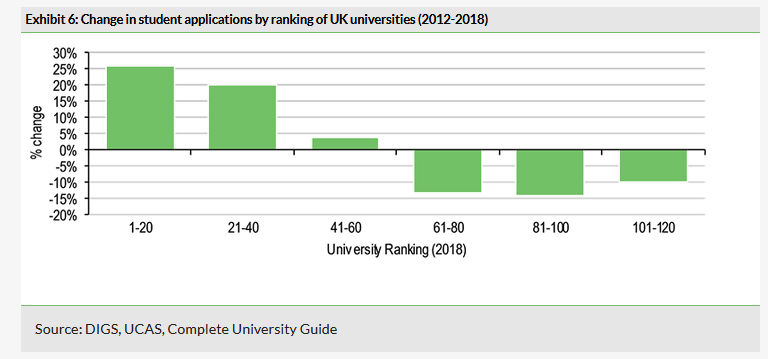
In Exhibit 9, we focus on the three UK-listed student accommodation companies, DIGS, Unite and Empiric, showing summary valuation and share price performance data. Reflecting positive sector fundamentals, all three stocks are trading very close to 12-month share price highs. DIGS offers a higher dividend yield compared with Unite and trades at a lower P/NAV. Empiric has a higher yield but as it continues to reposition itself from internally driven trading problems in 2017, the prospects for dividend growth are modest.
In the near term, the continuing strong fundamentals in DIGS’s target areas of the market, and the further benefit to earnings, cash flow and dividend cover from the completion of assets currently under development, are positive indicators for DIGS’s performance. Perhaps even more important is the DIGS focus on larger and more efficient, well-designed and purpose-built assets, in good locations in supply-constrained markets, factors which provide comfort that the portfolio will be capable of sustaining performance over the long term.
